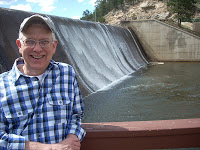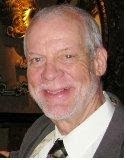church I grew up in: Brother W.F. Lown and Brother Charles Cook. Both highly
educated men were skillful preachers, fine administrators, and dedicated
ministers. Brother Lown baptized me at a rather early age because I insisted on
it. Several years later he spoke to me about becoming a minister. I was eight
years old when he planted that seed. I started paying attention to what was
being said around the church—sermons, lessons, conversations, and discussions.
When Lown left to become the president of a nearby church-related college, I
got to know Brother Cook, our new minister. I watched him carefully and was
surprised (and probably disappointed) one weekday afternoon at junior high
choir rehearsal when some girls were paying no attention and talking mindlessly
while we were practicing. He yelled, “What in the Sam Hill do you think you are
doing?” He made it clear he wanted us to work not gab. Although I was mildly
shocked, I realized that ministers were people with a full range of emotions.
That was probably the main experience that made it possible for me to actually
become a minister. That day I realized that ministers are human beings not
heroes, well all but one of them.
a few years older: The Reverend Doctor Martin Luther King, Junior. I paid
attention to his career, preaching, and activism. He eclipsed my attraction to
Billy Graham whom I also greatly respected. King’s power as a speaker got my attention,
but mostly his message of equality for all people made great sense out of the
old gospel message of salvation I had heard since the first Sunday after my
birth. And his message of racial equality filled a void made in my life by our
family’s move from the Army town where I was born to a small county seat town
where there were no African Americans, no persons of Asian descent, and only
two Hispanic people—a mother and her daughter. I missed people who looked,
thought, and lived differently. I missed people who were recent immigrants from
Germany, Japan or Puerto Rico. I missed many friends and neighbors who, thanks
to Kings preaching, I realized weren’t getting a fair shake in America. I liked
the practical, daily, living, moral message of his preaching. And of course I
liked his oratory and forceful leadership. I had a real hero—one who was a
warrior, a leader, a strategist, a public figure who served his people—the
whole people of the United States of America—and who paid the ultimate price
for his courage and leadership.
in Memphis, Tennessee took me to the MLK Memorial at the place King was
murdered, I realized this man, unlike activists I met in the late 1970s, was
not living high on the hog. He was staying in an old motel in downtown Memphis.
Nothing fancy. He lived with the least of these his brothers and sisters. And
he was a real human being with the full range of human emotions and experience.
King became my first hero and to date my only one.
time writing, painting, and socializing. In general, he keeps busy with groups
of writers and artists. Following thirty-two years in church work and fifteen
in a therapeutic massage practice, he now focuses on creating beauty. He
volunteers at The Center leading the SAGE program “Telling Your Story.”

